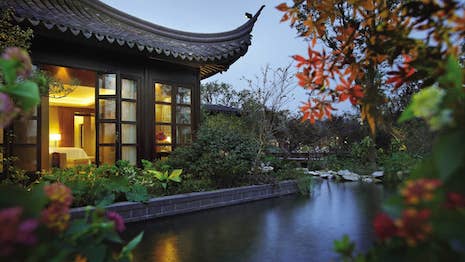- About
- Subscribe Now
- New York,
October 22, 2019

 Ancient Chinese saying: “In the universe, there is heaven; on Earth, there is Hangzhou.” Seen here: Four Seasons Hotel Hangzhou at West Lake. Image credit: Four Seasons Hotels & Resorts
Ancient Chinese saying: “In the universe, there is heaven; on Earth, there is Hangzhou.” Seen here: Four Seasons Hotel Hangzhou at West Lake. Image credit: Four Seasons Hotels & Resorts
Global luxury tourism will reach $831 billion this year out of a total $5.9 trillion overall spend in the tourism sector.
New DossierPlus data from Statista claims that luxury tourism will grow at an annual compounded growth rate of 7.3 percent in the next five years, outpacing the 6.4 percent forecast for the overall tourism market.
“The luxury tourism market accounts for 14 percent of the revenues today already,” said Friedrich Schwandt, founder/managing director of Statista, Hamburg, Germany, in a statement. “This makes it a highly competitive growth environment.
“A key trend that has been shaping luxury tourism in recent years is the increase in multigenerational travel,” he said. “Families are seeking an opportunity to spend quality time together and strengthen bonds.”
U.S., Asia lead
Statista identified trending destinations based on the highest total internal tourism revenues in their regions. The study therefore covers the luxury tourism business of nine countries: United States, China, Germany, India, Mexico, Australia, United Arab Emirates, South Africa and Morocco.
Luxury travelers in this study were defined by net assets of more than $1 million and average spend of $2,400 per travel day.
Per the study, the U.S. has the leading luxury travel market valued at nearly $263 billion. China is next at approximately $90 billion.
Asian luxury travelers are set to lead the market.
Statista claims China and India’s luxury markets will surge most rapidly through 2023, driven mostly by the growth of their domestic luxury markets.
YOUNGER LUXURY travelers in those markets and elsewhere are behind the increased spend in tourism as experience seeking takes precedence over material acquisitions for these cohorts.
“As millennials and Generation Z gain economic influence and represent an increasing proportion of luxury travelers, adventure, uniqueness, as well as sustainability also become vital, as they contribute to a high-profile social media image,” Mr. Schwandt stated.
Share your thoughts. Click here